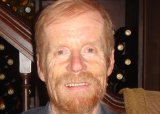 Just as the Paralympics came to a close, members of the International Society for Social Pediatrics practised running on the West Sands beach on St Andrews where the opening scenes of Chariots of Fire was filmed and where local pupils re-enacted the run with the Olympic torch just a few weeks ago. The theme of empowerment of vulnerable children, so significant in the marvellous Paralympics, ran through this conference, the first since ESSOP (the European Society for Social Pediatrics) became ISSOP.
Just as the Paralympics came to a close, members of the International Society for Social Pediatrics practised running on the West Sands beach on St Andrews where the opening scenes of Chariots of Fire was filmed and where local pupils re-enacted the run with the Olympic torch just a few weeks ago. The theme of empowerment of vulnerable children, so significant in the marvellous Paralympics, ran through this conference, the first since ESSOP (the European Society for Social Pediatrics) became ISSOP.
In addition to this theme, the focus of the meeting was evidence into practice and evidence into policy—focusing first on how we can bring evidence into our clinics, and second on how health professionals can influence governments towards child health. For me, three memorable messages emerged from this exciting meeting, attended by paediatricians, public health doctors, and others from all over Europe, Russia, Canada, and Australasia.
The first was the contribution of young people, two of whom attended from the organisation Inspector 8. This marvellous group inspects hospitals in Scotland and offers a child and young person perspective which has influenced services to be more teenager centred. At the meeting they ran a workshop and took part in a panel with Scotland’s Chief Medical Officer, in which they gave their views on alcohol, drugs, and smoking as well as on the voting age (should be lowered to 16). The UN Convention on the Rights of the Child Article 12 states that young people’s views should be heard and this concept is still rare in the health service, but was brought to life by Amy and John.
The second message came from two sessions with international speakers—brought from Geneva (WHO) and South Africa by Skype. Can you run a panel with two speakers on Skype? The answer was a resounding yes, and we were able to discuss essential drug prescribing in South Africa and the WHO programme on newborn care, without imposing any fossil fuel burden on the speakers. This practice must become universal at international meetings in future.
And finally—we heard an inspiring talk by Scotland’s Chief Medical Officer, Harry Burns, on his approach to bringing evidence into Scottish government policy. He believes in relying on science rather than ideology, and explained how this led him to see the need in government policy for a focus on the early years of life. Having seen the evidence from brain pathology of neglected children, this lead him to an understanding that early years support is essential for all children. To me this, and other aspects of Scottish policy on alcohol and smoking, sets an example which the English health service has yet to follow.
And running on the beach? This formed a fitting end to an inspiring meeting—and connected us with the hugely inspiring Olympic summer of London 2012.
Tony Waterston is a paediatrician in Newcastle-upon-Tyne, working mainly in the community with long term conditions, disability, child abuse, and social and mental health concerns. His interests are in child public health, children’s rights, and global child health and he leads the RCPCH teaching programme in the occupied Palestinian territories.